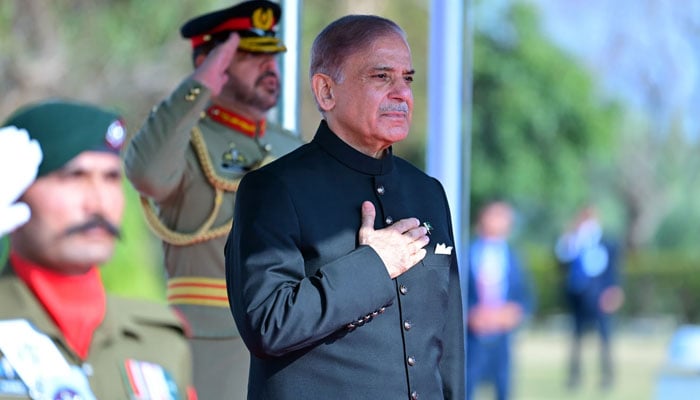Could Shehbaz normalise ties with India?
Narendra Modi congratulated Shehbaz Sharif on becoming the head of Pakistan’s government
ISLAMABAD: Indian PM Narendra Modi congratulated Shehbaz Sharif on becoming the head of Pakistan’s government, prompting hopes for a diplomatic thaw. But Shehbaz Sharif would need to face massive obstacles in reaching out to New Delhi, reports a foreign media outlest.
Pakistan has formed a new government led by Shehbaz Sharif — and the message sent to Shehbaz Sharif by India’s Narendra Modi, though brief and simple, felt like a sign of changing times after years of strained ties and occasional cross-border violence.
“Congratulations to [Shehbaz Sharif] on being sworn in as the prime minister of Pakistan,” Modi wrote on X, formerly Twitter.
Shehbaz Sharif responded days later with an equally curt post, thanking Modi for his “felicitations.”
But this was enough to get people talking, including diplomats beyond the borders of the two South Asian nations. Following Modi’s message, the US said it would “welcome productive and peaceful talks between India and Pakistan.”
The exchange comes after Shehbaz Sharif’s brother, former prime minister Nawaz Sharif, also made conciliatory gestures in recent months. Some circles are already speculating if the new Pakistani prime minister is preparing steps to normalise diplomatic ties with New Delhi.
Former ambassador Maleeha Lodhi told DW that India was to blame for strained ties, especially due to New Delhi’s “refusal to discuss Kashmir” after making unilateral changes in the region.
While it was true that some of the previous Pakistani governments were “more amenable to engaging with India,” this was “always reciprocal” at the time.
“Today there are many obstacles to normalising ties with Delhi, not easy to overcome,” she said.
-
 Prevent Cancer With These Simple Lifestyle Changes
Prevent Cancer With These Simple Lifestyle Changes -
 Experts Reveal Keto Diet As Key To Treating Depression
Experts Reveal Keto Diet As Key To Treating Depression -
 Inter Miami Vs Barcelona SC Recap As Messi Shines With Goal And Assist
Inter Miami Vs Barcelona SC Recap As Messi Shines With Goal And Assist -
 David Beckham Pays Tribute To Estranged Son Brooklyn Amid Ongoing Family Rift
David Beckham Pays Tribute To Estranged Son Brooklyn Amid Ongoing Family Rift -
 Jailton Almeida Speaks Out After UFC Controversy And Short Notice Fight Booking
Jailton Almeida Speaks Out After UFC Controversy And Short Notice Fight Booking -
 Extreme Cold Warning Issued As Blizzard Hits Southern Ontario Including Toronto
Extreme Cold Warning Issued As Blizzard Hits Southern Ontario Including Toronto -
 Lana Del Rey Announces New Single Co-written With Husband Jeremy Dufrene
Lana Del Rey Announces New Single Co-written With Husband Jeremy Dufrene -
 Ukraine-Russia Talks Heat Up As Zelenskyy Warns Of US Pressure Before Elections
Ukraine-Russia Talks Heat Up As Zelenskyy Warns Of US Pressure Before Elections -
 Lil Nas X Spotted Buying Used Refrigerator After Backlash Over Nude Public Meltdown
Lil Nas X Spotted Buying Used Refrigerator After Backlash Over Nude Public Meltdown -
 Caleb McLaughlin Shares His Resume For This Major Role
Caleb McLaughlin Shares His Resume For This Major Role -
 King Charles Carries With ‘dignity’ As Andrew Lets Down
King Charles Carries With ‘dignity’ As Andrew Lets Down -
 Brooklyn Beckham Covers Up More Tattoos Linked To His Family Amid Rift
Brooklyn Beckham Covers Up More Tattoos Linked To His Family Amid Rift -
 Shamed Andrew Agreed To ‘go Quietly’ If King Protects Daughters
Shamed Andrew Agreed To ‘go Quietly’ If King Protects Daughters -
 Candace Cameron Bure Says She’s Supporting Lori Loughlin After Separation From Mossimo Giannulli
Candace Cameron Bure Says She’s Supporting Lori Loughlin After Separation From Mossimo Giannulli -
 Princess Beatrice, Eugenie Are ‘not Innocent’ In Epstein Drama
Princess Beatrice, Eugenie Are ‘not Innocent’ In Epstein Drama -
 Reese Witherspoon Goes 'boss' Mode On 'Legally Blonde' Prequel
Reese Witherspoon Goes 'boss' Mode On 'Legally Blonde' Prequel




